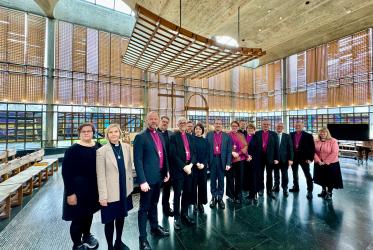Anders Wejryd, one of the presidents of the World Council of Churches (WCC) and Archbishop Emeritus of the Church of Sweden, has been committed to climate issues since the start of the 1970s and the worldwide oil crisis of that time. To attain a vision of life in God’s kingdom – a healed creation and humanity in a harmony of justice, freedom and peace – Wejryd believes the issue of climate change must be taken seriously. He says that it is about safeguarding the creation, but that it is also an issue of justice and peace.
During his time as Archbishop in 2008, he organized an interfaith meeting with about 30 religious leaders from all around the world. An interfaith manifesto was adopted at the meeting and submitted to the Swedish government and to the UN prior to the climate change conference in Copenhagen. Wejryd also initiated the formation of an interfaith council in Sweden. A couple of months before he retired in June, he issued a bishops’ missive on the theme of climate. This is the second to be issued by the Bishops’ Conference; the first was issued back in 1989. It is a joint document, in which all the Swedish bishops present their view of the creation and our joint responsibility for it.
We belong together
“For me it is natural to work using an interfaith approach because we belong together. We need to meet and discuss joint issues, such as climate.” Wejryd is very much looking forward to the climate summit in New York this September. “The WCC can add an extra dimension to the discussion. It is an opportunity to inspire courage and hope. We believe in the individual’s opportunity to take part and change,” says Wejryd.
His commitment was sparked early on, during his studies at Sandöskolan college in 1973. The doctoral thesis he started writing about Nathan Söderblom (who became Archbishop of the Church in 1914 and a Nobel peace laureate in 1930) sparked his commitment to ecumenism and peace issues. This thesis remained unfinished due to his director’s job at the pastoral welfare, healthcare and training association Ersta diakoni, and Wejryd’s own positions as Bishop of Växjö Diocese, later as Archbishop of the Church of Sweden and now as President of the European section of the WCC.
“The oil crisis is what got me involved and made me realize how our lifestyle affects climate change. The climate issue, the refugee issue and the peace issue belong together. Everything is intertwined with each other – we must realize this,” says Anders Wejryd.
“I gained the opportunity early on to take active responsibility and I served on the board of the Church of Sweden Aid throughout the 1970s. At that time I thought that many others were addressing the climate issue so it was perhaps not the primary task of the church. But after awhile I realized that we can add something that others cannot. Most people present threats; we can add opportunities, knowing that people can change, and that life and life’s opportunities, day by day, are gifts from God.”
Life is a gift
How should we think about our lifestyle? How should we save the creation?
“To attain a vision of life in God’s kingdom – a healed creation and humanity in harmony with justice, freedom and peace – the issue of climate change must be taken seriously. It is about safeguarding the creation, but it is also a justice issue. Let us realize that Life is a gift. We cannot assume that it must be in a certain way, something that we deserve. We receive, constantly. If we think in this way, it becomes easier to let go and dare to share and distribute. Life comes before our own pent-up needs for material things.”
Wejryd adds, “It is our legacy to take care of the creation. For a century it has been possible to find alternative solutions to environmental problems and we have bought ourselves time; however, that time has passed – now we must shoulder our responsibility together!”
“As churches we can inspire hope and courage to dare to change the world, to change our lifestyle and that of others. We can show that people have the skills and ability to change, and we can call attention to the fact that it is our joint responsibility through words and actions,” says Wejryd.
“The aim of this letter, the bishops’ missive, is to make a theological contribution to the discussion on climate and sustainability in Sweden, but also to encourage the Church of Sweden to work on climate and sustainability issues in both words and actions. A bishops’ missive can also constitute an important contribution to national and international ecumenical work in order to heighten awareness of the ethical and existential dimensions of the climate change issue.”
The bishops’ missive concludes by setting challenges for the Church of Sweden and churches worldwide, as well as for decision makers in Sweden and internationally, companies and organizations and individuals.
“We would like to share the thoughts of the Bishops’ Conference about our joint responsibility for the climate, what the Church can do and what we can all contribute. We can all help! We all have a responsibility!” concludes Anders Wejryd.
In answering the question of how he will contribute to the climate work in his new role as WCC President for Europe, he says modestly that he may be of service if he can inspire others to deepen their involvement in climate-related issues. His next task is to attend the WCC Interfaith Climate Summit in New York in September.





